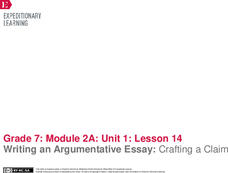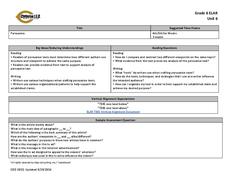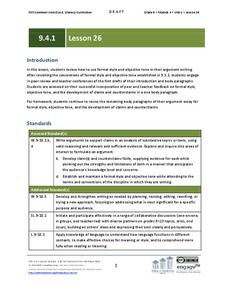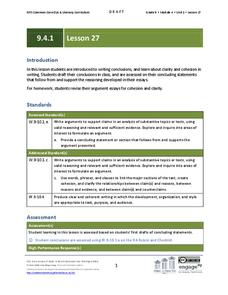EngageNY
Writing an Argumentative Essay: Crafting a Claim
As scholars prepare to craft their essays based on Katherine Paterson's Lyddie, they learn about using compelling reasons in their writing. Next, they develop a claim about whether Lyddie should sign a petition to speak out against...
EngageNY
Writing an Argument Essay: Evaluating the Model and Crafting a Claim (Chapter 28, Including Synthesis of Scenes in Previous Chapters)
Scholars use the model essay from the previous instructional activity to create their own argumentative essays. Readers make a claim about Atticus defending Tom in To Kill A Mockingbird. They then use graphic organizers to develop and...
EngageNY
End of Unit 2 Assessment: Final Draft of Literary Argument Essay
Take the last step in writing a literary argument essay using Bud, Not Buddy by Christopher Paul Curtis in an activity focused on feedback. Using the stars and steps revision method, pupils consider teacher and peer feedback to revise...
Fluence Learning
Writing an Argument: Persuasive Speeches to Students
Powerful orators make their messages compelling with a combination of factors. Learn how to be an inspirational speaker with a reading assessment activity that presents a list of persuasive speaking techniques, as well as two speeches...
EngageNY
End of Unit 2 Assessment: Final Draft of Literary Argument Essay
It's a common mistake. Scholars begin with a mini lesson about common errors in draft essays. They then complete a stars and steps peer critique of essay drafts. To finish, learners revise their essays and finalize their drafts.
Cleburne Independent School District
Grade 6 English Language Arts and Readiness: Persuasive
What is the best way to compare and contrast viewpoints on the same topic? A persuasive writing unit plan addresses targeted skills, vocabulary, instructional strategies, and suggested resources that would be perfect for developing writers.
EngageNY
Planning for Writing: Introduction and Conclusion of a Literary Argument Essay
After completing three body paragraphs of an argument essay about life's rules to live by from Bud, Not Buddy Christopher Paul Curtis, it's time to begin writing the introduction and conclusion. Independently, pupils draft the final two...
EngageNY
Mid-Unit Assessment, Part 1: Tracing and Evaluating Arguments
It's test time! As part one of the mid-unit assessment, scholars complete a Tracing an Argument note-catcher for both a text and a video about the Internet's effect on the brain. Pupils demonstrate learning by evaluating the argument and...
EngageNY
Writing an Argument Essay: Planning the Essay
It's time for a quote sandwich! Using the resource, pupils learn about the three parts of an effective quotation: introduction, quote, and analysis. Scholars use the model to peer critique each others' writing to show what they learned.
Academy of American Poets
Women in Poetry
Imagine linking poetry to technology! Thirty-three lessons comprise a 6-week "Women in Poetry" unit for high schoolers. Class members research women poets, learn how to respond electronically to discussions, write their poems, create web...
EngageNY
End of Unit 1, Assessment, Part 2: Revise Essay Drafts
As a culminating unit activity, pupils revise their argumentative essays based on the novel Lyddie by Katherine Paterson. Paying careful attention to grammar, punctuation, and vocabulary, they incorporate teacher feedback to revise and...
EngageNY
End of Unit 2 Assessment, Part 1: Drafting the Essay
Young writers use the class time to complete a draft argumentative essay. In answer to the Pygmalion end-of-unit prompt they discuss the change seen in Eliza's inner identity.
EngageNY
Grade 9 ELA Module 4, Unit 1, Lesson 22
Class members read "Satyagraha," the concluding section of Marc Aronson and Marina Budhos' Sugar Changed the World: A Story of Magic, Spice, Slavery, Freedom, and Science, and analyze how the authors support their claim that terrible...
EngageNY
Grade 10 ELA Module 3: Unit 3, Lesson 11
It's time to show what you know. Scholars finalize their argumentative essays by making last-minute revisions to conventions, tone, and formal style. Learners review the checklist to ensure they have met all the task requirements. They...
EngageNY
Grade 10 ELA Module 3: Unit 3, Lesson 10
Can budding writers accept constructive criticism? Learners work with their peers to gain feedback about their argumentative essay drafts. Peers give one another constructive criticism to revise their work better. Using a Peer Review...
EngageNY
Grade 10 ELA Module 3: Unit 3, Lesson 9
Let's join together and make a sentence. Scholars take the next step in revising their argumentative essays by combining independent clauses to make complex sentences. Writers use a Colon and Semicolon Handout to practice different ways...
EngageNY
Grade 10 ELA Module 3: Unit 3, Lesson 6
And that's a wrap! Scholars create their concluding statement drafts by examining model text with exemplar conclusions. In pairs, they discuss how transitional words and phrases add to sentence structure and consider how their concluding...
EngageNY
Grade 10 ELA Module 3: Unit 3, Lesson 4
Always try to make an excellent first impression. As scholars begin to write their argumentative essays, they learn the importance of a good introduction. Writers also begin to add in-text citations to their papers. After reading a model...
EngageNY
Grade 9 ELA Module 4, Unit 1, Lesson 28
As writers continue to revise their argument essays, the focus shifts to editing grammatical conventions, parallel structure, and varying syntax to add interest. After examining model sentences that demonstrate sentence variety, writers...
EngageNY
Grade 9 ELA Module 4, Unit 1, Lesson 26
The focus of the day's instructional activity is methods for creating a formal style and objective tone in an argument essay. After examining models, pairs engage in peer review of their essay drafts and continue to revise while...
EngageNY
Grade 9 ELA Module 4, Unit 1, Lesson 27
Crafting a clear and cohesive conclusion to any piece of writing is crucial. An effective conclusion restates the central claim in the introduction, briefly summarizes the supporting claims, and presents a new way of thinking about the...
EngageNY
Grade 9 ELA Module 4, Unit 1, Lesson 13
Class members conclude their reading of the supplemental text, “Bangladesh Factory Collapse: Who Really Pays for our Cheap Clothes?” and use the provided Evaluating Argument and Evidence Tool to analyze the evidence Anna McMullen uses to...
EngageNY
Grade 9 ELA Module 4, Unit 1, Lesson 14
As a mid-unit assessment, writers use evidence from the supplemental reading articles "Globalization," "Our Addiction to Fast Fashion Kills," and "Bangladesh Factory Collapse: Who Really Pays for Our Cheap Clothes?" to draft an argument...
EngageNY
Grade 9 ELA Module 4, Unit 1, Lesson 2
The second instructional activity in a unit about how writers develop their central ideas and use evidence to support their arguments focuses on the role that scholars at Jundi Shapur, "The World's First True University," played in the...

























